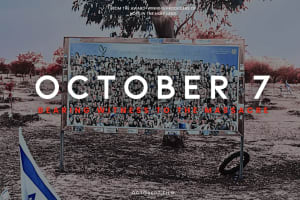Israeli comedian detained after waiving national flag at Eurovision song competition in Sweden
Eurovision marred by political controversy and security restrictions ahead of Israeli Eden Golan's performance

Israeli comedian Guy Hochman found himself in a not-so-funny situation after being detained by police on Tuesday in Malmö, Sweden, shortly after his arrival for the Eurovision Song Competition being held there.
Hochman traveled to the competition to show his support for Israeli-born singer, Eden Golan and record his experiences for his followers on social media.
The Israeli celebrity, who had wrapped himself in an Israeli flag, was verbally assaulted and spat at by anti-Israel protesters for waving the national flag at the Eurovision Contest in support of the Israeli contestant.
Two local police officers intervened in the dispute and detained Hochman, informing him that it was not appropriate to display Israeli flags or to be Jewish in that location.
Hochman expressed frustration at the double standard, saying that while he was prohibited from waving an Israeli flag, the anti-Israel protesters were allowed to display their Palestinian flags without any interference.
This is not the first time Hochman has been in situations where Jews and Israelis were blacklisted or unwelcome.
During the 2022 World Cup, he traveled to Qatar to create comedic videos with soccer fans. Hochman was met with both friendly and hostile responses while attending the event.
The Eurovision Song Contest in Malmö kicked off on Tuesday evening with an opening act by performer Eric Saade, a Swedish singer whose father is Palestinian. Saade came out on stage with his wrist wrapped in a keffiyeh, a Palestinian symbol used in pro-Palestinian and anti-Israel protests. This provocative gesture by the former Eurovision contestant prompted a rebuke from organizers for making a political statement.
Saade blasted Eurovision organizers last week for their long-held ban on flags and symbols that represent any nation not participating in the contest, including the Palestinians. On his social media account, he wrote that the European Broadcasting Union (EBU) was “disgraceful” and accused it of circulating “Israeli propaganda.”
According to The Times of Israel, in response to their request for comment, the EBU said that the show is recorded live and that “all performers are made aware of the rules of the contest,” adding. “We regret that Eric Saade chose to compromise the non-political nature of the event.”
During the rehearsals for the international competition, Saade did not wear the keffiyeh. Because he is not a contestant in this year’s competition, it remains unclear whether he will face any consequences for violating the contest's rules.
Organizers for the contest have been on high alert for disruptions and altercations this week amid political conflict, with major protests expected in Malmö against Israel’s participation in the Eurovision competition. The city has significantly bolstered its police presence, including bringing in reinforcements from nearby Denmark and Norway, even emptying local jail cells in case of mass arrests.
Police have banned protests from taking place near the arena, however, the largest anti-Israel rallies are expected on Thursday, when Israel’s contestant, 20-year-old Eden Golan will appear a second time in the semifinal with her song, “Hurricane.” Golan has mostly been confined to her hotel room due to death threats on her social media accounts.
Heavy security remains in place for Golan amid a series of threats against the Israeli delegation in the region. Additionally, the head of Israel's Shin Bet (security agency), Ronen Bar, visited Malmö last week to coordinate security ahead of the event.
At the end of Tuesday’s semifinal, 10 nations advanced to Saturday’s grand finale, including the Israeli-born singer Tali Golergant representing Luxembourg, who goes by the mononym Tali.
Golergant was born in Israel and raised in Chile, Argentina and Luxembourg.
The country of Luxembourg returned to Eurovision this year after a 31-year absence with the French- and English-language song “Fighter.”
In an interview last month with The Times of Israel, Golergant said she has faced online hate for her Israeli roots but doesn’t let it affect her.
The other countries that qualified for the semifinals on Tuesday were Ireland, Croatia, Cyprus, Ukraine, Lithuania, Finland, Serbia, Portugal and Slovenia.
In a press conference after the competition, contestant Bambie Thug, an Irish singer whose music is known for being inspired by witchcraft and drugs, told reporters that they were forced to change a subliminal message calling for a ceasefire in Gaza after a complaint from organizers.
A local reporter asked the singer about the messages appearing on her face and leg in the ancient Irish language of Ogham, which read “ceasefire” and “freedom for Palestine.”
In response, she said that she wanted to send that message because “I am pro-justice and pro-peace” but added, “Unfortunately, I had to change those messages… on order from the EBU.”
A total of 26 nations will compete on Saturday evening for the chance to win the top prize at the contest, with projections strongly favoring Croatia, which has never won the competition before.
Israel has won the Eurovision singing contest four times with the most recent award in 2018.

The All Israel News Staff is a team of journalists in Israel.
You might also like to read this:

















